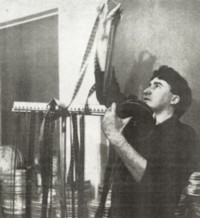I had one man tell me that fantasy had taught him to be a grownup fan rather than a child fan. The St. Louis Cardinals don't care about me. Why should I care about them? But I do care about whether or not I win my rotisserie league. Because I spend time almost 12 months out of the year researching, planning, managing, negotiating.

"Don Levy" was an artist and filmmaker.
Levy was born in Bathurst, New South Wales, Australia. After studying theoretical chemistry at the University of Sydney, he was awarded a Research Scholarship to the University of Cambridge. There he obtained a PhD in Theoretical Chemical Physics in 1960. While at Cambridge, Levy became involved in the Film Society and made his first short films. After Cambridge he was awarded the first ever film scholarship in Britain to study in the newly created Film Department of the Slade School of Fine Art under the leadership of filmmaker turned lecturer Thorold Dickinson. He then made a number of short films for the Nuffield Foundation, including the experimental documentary Time Is (1964).
More Don Levy on Wikipedia.They will describe success in fantasy sports as being a highly rational, statistics-driven phenomenon, and like in any sort of statistical process, you can't let one good game by one player affect your planning in fantasy sports. So they try not to watch too many games - because they don't want to be influenced by the events on the field.
To a great extent, this is what they think about when they're in the shower or alone in their car. What trade can I make? What lineup alteration can I get involved in? I would describe it as on one end, obsessive, on another end, it's just simply the background rhythm of life that this group of people has decided to occupy their physical time and their mental energy with.
When you talk to people who play, the fantasy-baseball player tends to be more ardent than the fantasy-football player. Baseball is a game that is played every day, and baseball as a game in fantasy has so many more permutations than does fantasy football.
A lot of fantasy players feel now as though winning in their fantasy league is more important than what they will at times describe as their childlike loyalty to one team.
Copyright © 2024 Electric Goat Media. All Rights Reserved.